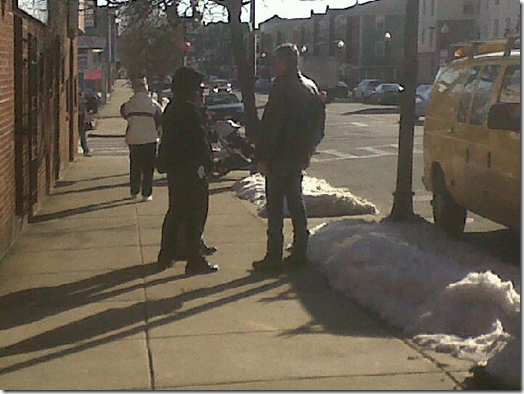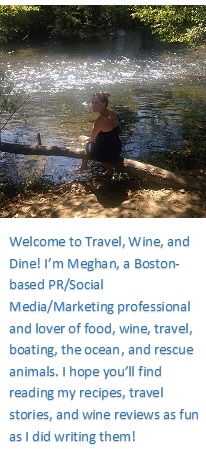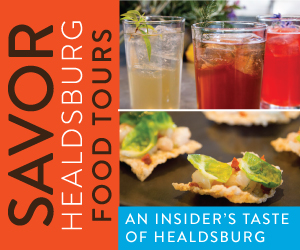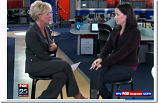You may have already seen my tweet this morning, but a few miles into my 16 mile run, I ran right past Anthony Bourdain! I knew he was filming in Boston, but I never in a million years thought I would see him on this stretch of Broadway in Southie! I actually heard him first; that voice is unmistakable! He is also pretty darn tall. I thought about stopping to say something, but what? Plus I was a sweaty mess from running, so I just kept on keepin’ on. . . with a little extra pep in my step!
Have you ever met or seen food or wine celebrities in real life? My other very exciting celebrity encounter was Kevin from Top Chef on my birthday!
And now for the real post this afternoon. I actually wrote the below post for another site prior to my final exam for the Level 2 wine class at Boston University. I never got to publish it, and I thought it was worth sharing with all of you. I did end up passing the class but missed quite a few questions which happened to coincide with classes that I missed due to my bout with pneumonia, my trip to California, and the birth of my nephew. I didn’t really have control over missing those classes, but in hindsight I should have spent a lot more time reading and taking notes.
~~~~~~~~~~~~~~~~~~~~~~~~~~~~~~~~~~
My final exam looms in front of me, 14 weeks of tasting notes cover my desk, and the ever-by-my-side World Atlas of Wine is getting even more attention than usual. At this time, I get to look back fondly at the last 14 weeks in the Level 2 class, A Comprehensive Survey of Wine, Spirits, and Beer, at the Elizabeth Bishop Wine Resource Center at Boston University. I can not put into words all that I have learned’; let’s hope I remember it all on final exam day!
Every Tuesday this semester I spent three hours at Boston University in a room full of eager oenophiles with various levels of knowledge. The course, which is co-taught by Bill Nesto MW, Sandy Block MW, and Stacy Woods CSW, lays out several major objectives for the semester. Students should be able to:
- Exhibit detailed knowledge of wine regions, grape varieties, and styles
- Demonstrate refined tasting ability
- Understand inherent characteristics of wine
- Identify broad categories of beer and spirit
The setup of each class was generally the same with a lecture/discussion about the region or regions of focus for the week followed by a tasting of a variety of wines from the region/s. We learned to taste wine critically, paying attention to and noting the eye (effervescence, clarity, hue, density, rim/core) the nose (cleanliness, intensity, smells), the mouth (sweetness, bitterness, sourness, effervescence, viscosity, heat, astringency,smells, length) and the assessment (body, texture, complexity, balance, concentration), and finally the identity (origin, varietal(s), vintage, alcohol %, vinification method, quality/type, retail $).
And while each week of tasting wine, learning about its geographic origins, and maybe hearing a personal story about the winery or winemaker kept me consistently engaged throughout the semester, my favorite class was still what instructor Stacy Woods called “The Dry Class”. As you might infer, the dry class was the only class sans wine and the class in which we students learned the building blocks that we will build upon in everything wine-related that we do. The focus of the class was everything background, The History of Wine, Viticulture and Vinification. Despite being a three hour lecture, this class passed by quickly and really set the stage for me wanting to learn more over the weeks that came after. The information in this class was some weighty stuff but so important for what was to come.
On the first day of class, it was made clear that this was not a wine tasting but a serious program that needed to be treated like any other educational program. It is crucial to do the reading for the class each week before going to class to avoid staring blankly at the instructor as he or she presented the material. And let me tell you right now, the midterm is hard, and I can only expect the final exam to be more difficult.
Throughout the course, my appreciation for wine deepened exponentially, and my knowledge increased quite bit. There were days where I rued the decline of my once-perfect memory and nights that I wondered if I had faulty senses, only to realize that time, attention to details, and more serious tasting practice were the key to success in this area.
Overall, my only criticism of the course is that there might just be too much information for one semester. The tasting portion sometimes felt very rushed, and while beer and spirits are of course important, I would love to see that class used for wine so that some of the other classes could be paced a little more evenly.
I still have so much to learn, but if you are interested in wine and are willing to put in some time and dedication to take a class seriously, the Elizabeth Bishop Wine Resource Center is a great place to start. And even if you don’t have the time or desire to make the full-semester commitment, the center offers a variety of other events and tastings where you can whet your appetite for wine education.
Tags: Anthony Bourdain, Boston University, wine, wine class, wine education, wine tasting








8 comments
Comments feed for this article
Trackback link: http://traveleatlove.me/2011/01/bourdain-and-wine-classes-at-bu/trackback/